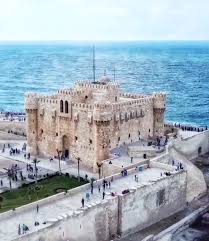

A Tour day TO Qaitbay Citadel, Catacombs of Kom el-Shoqafa, Column of Pompey and The Roman Theatre of Alexandria
AT FIRST
01) Qaitaby Citadel
Qaitbay Citadel, or Citadel of Qaitbay, is a historic fortress located on the Mediterranean Sea at the entrance of Alexandria’s harbor. The citadel was built in 1477 AD by Sultan Qaitbay, a Mamluk ruler, to protect Alexandria from invasions, particularly from the Ottoman Empire.
The citadel features a robust defensive structure, with thick walls, towers, and a strategic layout designed for military defense. The architecture reflects Mamluk design elements, combining functionality with aesthetic appeal.
The citadel has undergone various restoration efforts to preserve its structure and enhance its appeal as a tourist destination. It is now a popular site for both tourists and locals, showcasing exhibitions related to Alexandria’s maritime history.Qaitbay Citadel remains a testament to Alexandria’s strategic importance and architectural heritage, continuing to be an integral part of the city’s identity
SECONDLY
02) Catacombs of Kom el-Shoqafa
The Catacombs of Kom el-Shoqafa, located in Alexandria, Egypt, are a fascinating archaeological site that dates back to the 2nd century AD. This unique burial site is a blend of Egyptian, Greek, and Roman architectural styles, reflecting the cultural diversity of ancient Alexandria.
The catacombs were discovered in 1900 when a donkey fell into a deep pit, leading to the uncovering of this extensive burial complex.
The site consists of a series of underground tunnels and chambers, carved out of rock. The architecture combines elements from various cultures, showcasing a mixture of Greco-Roman and Egyptian design.
The catacombs provide valuable insight into the burial customs and religious practices of the time, highlighting the cultural syncretism that characterized Alexandria during the Roman period.
The Catacombs of Kom el-Shoqafa remain a significant testament to the rich history and cultural interactions of ancient Alexandria.
THIRDLY
03) The Column of Pompey
The Pompey’s Pillar, or the Column of Pompey, is an iconic historical monument located in Alexandria, Egypt.
The pillar was built in 297 AD to honor the Roman Emperor Diocletian, not Pompey, despite its name. It commemorates the Roman victory over the rebellious Egyptians.
Standing at approximately 25 meters (82 feet) high, the column is made of red granite and features a Corinthian capital. It is one of the tallest ancient columns still standing today.
The name “Pompey’s Pillar” is a misnomer. It is often believed to be named after the Roman general Pompey the Great, whose head was said to be found nearby, but there is no historical evidence linking the column to him.
Pompey’s Pillar remains a prominent symbol of Alexandria’s ancient history and architectural achievement
FOURTH
04) The Roman Theatre of Alexandria
The Roman Theatre of Alexandria is an important archaeological site that offers insights into the cultural and architectural practices of ancient Alexandria. Here are some documented details about the theatre:
The Roman Theatre is situated in the Kom el-Dikka area of Alexandria. It was discovered in 1960 during construction work and has since been excavated and studied.
The theatre is semi-circular in design, typical of Roman theatres, and could accommodate around 800 spectators. It features a marble seating area (cavea) and a stage (orchestra) that highlights the blend of Greek and Roman architectural elements.
Excavations around the theatre have revealed other significant structures, including remnants of ancient villas, baths, and mosaics, providing a broader context for understanding the daily life of Alexandrians during the Roman period.The Roman Theatre of Alexandria stands as a testament to the city’s rich cultural history and its role as a center of art and entertainment in the ancient world

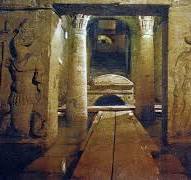
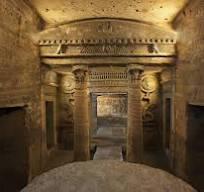
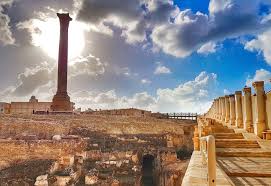
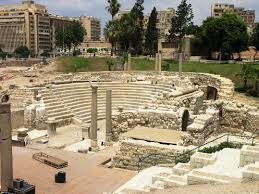
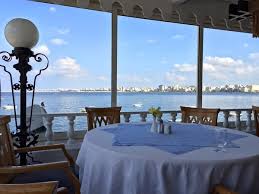
لا تعليق